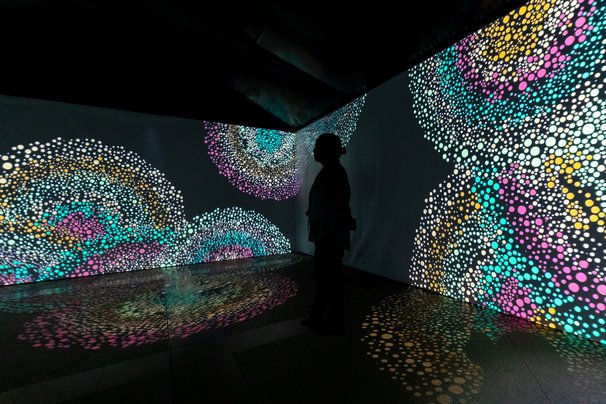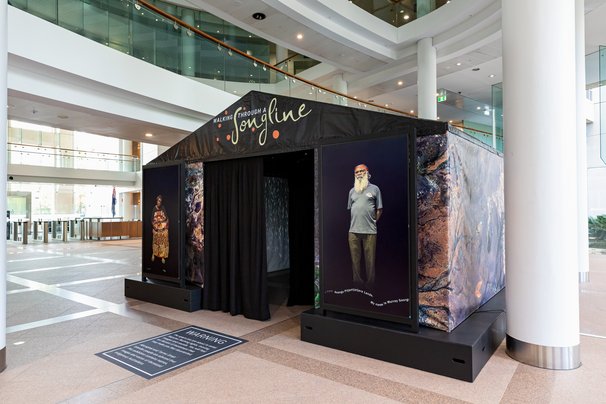Walking through a Songline
National Exhibition Register
-
 Walking through a Songline immersive projection
Walking through a Songline immersive projection- Image Credit
- National Museum of Australia
-
 Walking through a Songline marquee
Walking through a Songline marquee- Dimensions
- Footprint: 8.5 x 5.5 metres, 3 metres high
- Image Credit
- National Museum of Australia
About the exhibition
Walking through a Songline is a pop-up digital experience based on a component of the National Museum of Australia’s internationally acclaimed exhibition Songlines: Tracking the Seven Sisters.This ground-breaking show follows in the tracks of the Seven Sisters Tjukurrpa (Dreaming) across the Western and Central deserts of Australia as they are chased by a male pursuer. Their encounters are imprinted in the features of the land and tell of where to find food and water and how to behave correctly.
All Ancestral journeys create songlines, which can be seen as pathways or corridors of knowledge. The stories they hold form the foundational history of the Australian continent, as told by artists, custodians and traditional owners. You will get a sense of this in Walking through a Songline, a stand-alone immersive experience at the nexus between ancient knowledge and new technology, and suitable for all ages. Interpretative panels provide further insights into Australian Aboriginal songlines, exploring how an entire continent has been mapped for and by its people over millennia.
Artists and Curator
- Curator
- Adj. Professor Margo Neale
Available Dates and
Exhibition Details
- Available dates
- 09/12/2023 - 12/03/2027
- Exhibition size
- Under 50 sq or running metres
- Originating state
- ACT
- Organised by
- National Museum of Australia
- Price
- $8,000 (inc. freight)
- Web Site
- https://www.nma.gov.au/exhibitions/walking-through-a-songline
- Primary contact
- Heidi Elliott
- Position
- Touring Exhibitions Officer
- Organisation
- National Museum of Australia
- Phone
- 02 6208 5380
- touring@nma.gov.au
- Acknowledgement
- Walking through a Songline is developed by the National Museum of Australia and Mosster Studio with support from the Australian Government’s Visions of Australia program and the National Museum of Australia’s donor community.

